Fuel Cells News
Interim Guidelines Agreed for Training Seafarers on Green Ships
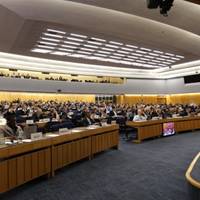
The IMO’s Sub-Committee on Human Element, Training and Watchkeeping (HTW) has agreed on draft interim generic guidelines for training seafarers working on ships powered by alternative fuels and new technologies. These draft guidelines will be submitted to the Maritime Safety Committee for approval in June 2025.Meeting in London from February 10 to 14, the Sub-Committee agreed that such guidance should be provided through both:• generic interim guidelines applicable across the whole industry and relevant to all alternative fuels and new technologies…
Meyer Werft Kicks Off Fuel Cells for Cruise Ship Retrofits Project
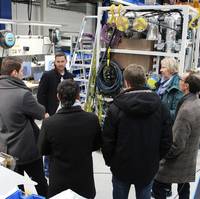
German shipyard Meyer Werft has launched the zero4cruise project with project partners including Freudenberg e-Power Systems and the German Aerospace Center (DLR).The project aims to develop climate-friendly and low emission energy systems for cruise ships, focusing on fuel cell technology powered by green methanol.The hybrid energy system will combine PEM fuel cells with a methanol reformer and battery systems to optimize efficiency and ensure ships can operate carbon-neutral…
The Technology Pathways that Lead to Fuel Cells
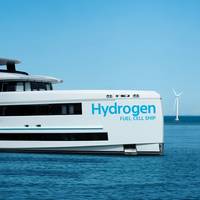
In an article by Rhonda Moniz published this week on MarineLink, Siemens sales executive Ed Schwarz noted the flexibility provided by an electric distribution “backbone” that enables ferry operators to add more batteries, switch to new fuels or become 100% emission free with fuel cells.A string of deliveries reported this week demonstrate that steps are being taken along this pathway for a range of vessels:The hull of Lithuania’s first green hydrogen and electricity-powered ship was launched by the Klaipėda State Seaport Authority.
Students to Demonstrate Potential of Liquified Hydrogen
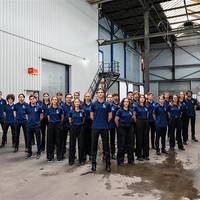
The 2025 TU Delft Hydro Motion Team, a team of 25 adult students, has designed a hydrofoiling boat that will be powered by liquified hydrogen.Their project builds on the work of previous students at the Dutch university in a program dating back to 2005.The first TU Delft design was solar powered; it was changed to compressed hydrogen in 2021.The 2024 team focused on applying hydrogen fuel to a seaworthy vessel and made history as the first hydrogen-powered boat to cross the North Sea.The 2025 team’s boat will be entered in the Monaco Sea Lab 2025.
RED II Compliance Demonstrated for Potential Compressed Hydrogen Supply Chain
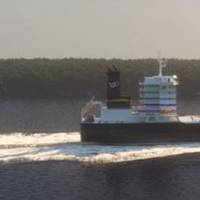
Provaris Energy has released preliminary results for meeting Europe’s Renewable Energy Directive II (RED II) emissions standards for its bulk hydrogen shipping concept based on its proprietary H2Neo carrier sailing between Norway and Germany.Implemented in December 2018, RED II sets stringent emissions standards aimed at fostering the use of renewable energy sources and reducing greenhouse gas emissions across the European Union. RED II mandates that by 2030, at least 32% of the…
PowerCell Reports Large Order for Its Marine Fuel Cells
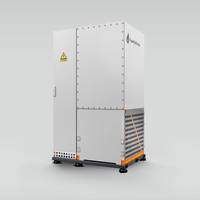
Sweden-based PowerCell Group announced it has signed one of the world’s largest orders of marine fuel cell systems to date with a Italian marine OEM manufacturer. The order value is approximately SEK 165 million (US$16.3 million) and the deliveries will begin in the middle of 2025 and be completed by the end of the year.The order is in three parts and consists of 56 units of the Marine System 225 in total where the majority will be installed on commercial cruise ships. The fuel cell systems will provide auxiliary power to a ship’s internal electricity systems, totaling more than 6.3 MW.
LR Partners with Amogy and RotoBoost to Slash Maritime Emissions
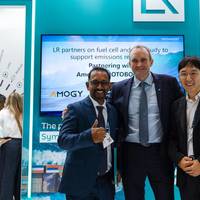
Classification society Lloyd’s Register (LR) is collaborating with Amogy and RotoBoost in a study aimed at reducing emissions in the maritime industry. The joint development project (JDP) will assess the potential of advanced technologies such as hydrogen fuel cells, ammonia-to-power systems, and pre-combustion Carbon Dioxide Capture Storage (CCS) systems from technical, financial, and regulatory perspectives.This partnership marks a significant step toward evaluating how these…
Methanol Reformer and Fuel Cell System Gains DNV AIP

PowerCell Group has secured an approval in principle (AIP) from classification society DNV for its methanol-to-power solution. The system integrates a methanol reformer from RIX Industries with the PowerCell Marine System 225, recently launched to aid in the maritime industry's shift toward cleaner energy sources.Methanol is emerging as a promising alternative fuel alongside hydrogen, contributing to maritime decarbonization and electrification. Given its availability in major global ports…
Corvus' Pelican Fuel Cell System Awarded DNV Type Approval
Corvus Energy announced that the Corvus Pelican Fuel Cell System has received Type Approval from DNV. The system, which was developed through the three-year-long H2NOR project, is the first Fuel Cell System (FCS) designed to be inherently gas-safe.Receiving type approval from DNV, a leading maritime classification society, confirms that the Corvus Pelican Fuel Cell System meets the most stringent performance and safety standards required by the maritime industry. Olaf Drews, Head of Engines & Pressurized Equipment Maritime…
Samskip Joins Fuel Cell Retrofit Project
Samskip has joined the EU HyEkoTank project and its LNG-fueled vessel Kvitnos will be retrofitted with TECO 2030’s zero-emission technology.Samskip Kvitnos, built in 2015, is a cargo ship which operates in a fixed route on a weekly multipurpose service from Rotterdam, along the Norwegian west coast, to Hammerfest. The project also aims to facilitate long-term hydrogen fuel supply contracts due to the vessel’s fixed route.The HyEkoTank project is the world’s largest ongoing fuel cell retrofit project…
Blue World Wraps Up Trials of 200kW Green Methanol Maritime Fuell Cell System
Denmark-based Blue World Technologies has completed the testing of the world’s first 200 kW high-temperature PEM fuel cell module, exceeding performance expectation of the system which aims to contribute to the decarbonization of the maritime industry.The test was completed at the newly established test facilities in connection to the Blue Aalborg Factory, where the fuel cells for the system are produced. The initial testing has been completed with great results which has exceeded performance expectations…
Samskip LNG Vessel to be Retrofitted with Fuel Cells
TECO 2030, BLOM Maritime and Samskip have received a grant for a pre-project aiming to retrofit Samskip’s vessel Kvitnos with TECO 2030 fuel cells and hydrogen fuel.The project aims to significantly reduce emissions from this LNG-fueled vessel, which currently operates on a weekly multipurpose service from Rotterdam along most of the Norwegian coastline to Hammerfest.The goal of the project is to prepare for an investment decision to retrofit Kvitnos. The project also aims to…
KR Signs MoU on Ammonia Fuel Cell Systems
KR has signed a Memorandum of Understanding (MoU) with Hanwha Ocean, Amogy, and Hanwha Aerospace at Posidonia 2024 for the technical collaboration and certification of ammonia reformers and ammonia fuel cell systems on ships.The ammonia reformers, used to produce gas with hydrogen as the main component and supply it to fuel cell stacks, are essential equipment for the adoption of fuel cell systems, says KR.The MoU encompasses design, development, testing, and certification of ammonia reformers and fuel cell systems.
TECO 2030’s Fuel Cell Running at 100% Capacity in Test Bed
TECO 2030 has successfully reached stable and maximum power output of zero emission hydrogen-electric power with its fuel cell system at AVL's test bed in Graz, Austria.TECO 2030’s fuel cell technology features a modular system with installed power capacity of 400kW. This includes high energy efficiency, an inherent safety concept, optimal weight and size dimensions, advanced component design, extended lifespan, and rapid dynamic load response.“This milestone is the biggest one so far in the history of TECO 2030 Group…
Report Analyses Fuel Cells for Deepsea Vessels
The Mærsk Mc-Kinney Møller Center for Zero Carbon Shipping has released a report providing a techno-economic assessment of fuel cell applications for onboard auxiliary power for deepsea vessels.The reportindicates that it appears unrealistic to assume that fuel cells will compete with or entirely replace onboard internal combustion engines in the near future, even as fuel cells reach a high technological maturity level. This is due to the high initial costs currently associated…
Brunvoll Propulsion Systems Chosen for Torghatten Nord’s Hydrogen Ferries
Brunvoll has been contracted to deliver the propulsion, maneuvering and autonomy systems for two hydrogen powered ferries for Torghatten Nord AS.The ferries will operate the harsh route to and from Lofoten in Norway, the Bodø-Verøy-Røst-Moskenes route. The hydrogen fuel cell ferries were designed by The Norwegian Ship Design Company AS. Both ferries included in the contract will be delivered from Myklebust Yard in 2026.The Brunvoll contract includes two azimuth propulsion thrusters, BruCon Propulsion & Thruster Control System, BruCon Auto-Crossing system and BruCon Condition Monitoring System.
EH Group's 250kW Marine Fuel Cell System Earns AIP from DNV
EH Group said its EH Fuel Cell System TRACE-M250, designed for high power and maritime applications, has been awarded approval in principle (AIP) following an assessment by classification society DNV to confirm that the fuel cell design meets all the applicable maritime rules, regulations, codes and standards.Based on EH Group’s stack technology, the 250kW EH TRACE-M250 module is designed to improve efficiency and safety, in a more compact and lightweight module, the Switzerland-based manufacturer said…
Design Approval Sought for Fuel Cell High-Speed Vessel
TECO 2030 and Umoe Mandal have delivered a documentation package to the Norwegian Maritime Authority for an approval in principle application of the world’s first fuel cell high-speed vessel design.The designed vessel is designed to be installed with a multimegawatt fuel cell system for full propulsion.The ship will be constructed based on Umoe Mandal’s proven Crew Transfer Vessel (CTV) Surface Effect Ship (SES) technology and with the air-cushion catamaran design it will offer low imprint on surrounding environment…
Printed Circuit Board Fuel Cell Technology Tested on Narrowboat
Bramble Energy has launched the world’s first hydrogen-electric boat powered by a printed circuit board fuel cell (PCBFC™).As the lead partner in the HyTime project working alongside custom engine builder Barrus, Bramble Energy has created a demonstration vessel that it says showcases the vast potential of its PCBFC™ technology to quickly and cost-effectively decarbonise the marine sector.A 57ft narrowboat was launched in Sheffield, UK, where it has successfully completed testing.
Zero-Emission Adriatic Ship Project Underway
The Zero Emission Adriatic Ship (ZEAS) project has commenced, with 13 partners from various European Countries. The overall project grant from EU Horizon is over EUR 13.5 million, where over EUR 2.3 million is reserved to TECO 2030’s deliverable of 1.2MW of fuel cells for full vessel propulsion.The project focuses on a full-scale demonstration of a hydrogen fuel cell-powered system on a ship, tailored for operation in the Adriatic Sea's delicate marine ecosystem. Key activities include the design and construction of the ship…
ClassNK Gives AiP for Yanmar’s Maritime Hydrogen Fuel Cell System
ClassNK has issued an Approval in Principle (AiP) for a maritime hydrogen fuel cell system developed by YANMAR Power Technology, marking the first AiP certification for a maritime hydrogen fuel cell system developed by a Japanese manufacturer.The 300kW maritime hydrogen fuel cell system, developed by Yanmar, is designed with key auxiliary components such as gas valve units integrated within the system enclosure, aimed to facilitate easy installation on ships.On top of that, the system allows for parallel connection of multiple units and adjustments to the number of hydrogen fuel cell modules,
Corvus to Integrate Ammonia Cracker with Its Pelican Fuel Cell
Corvus Energy on Monday announced it has been awarded funding through the EU's Horizon Europe Framework Program for the integration of ammonia cracker technology with its Pelican Fuel Cell system.The project, titled “APOLO”, is a collaboration between several partners and aims to solve the challenges of power conversion from ammonia and develop an efficient and flexible ammonia cracking technology for the maritime sector.The four-year program, which started January 1, 2024, will…
DNV Awards Cyber Security Type Approval for Corvus Energy's Orca ESS
Corvus Energy, a Norway-based provider of battery energy storage solutions and fuel cell systems for the marine sector, has been awarded a Type Approval from DNV for its Cyber Security Notation on the Control and Monitoring System of Corvus Energy's Orca Energy Storage System (ESS).The Type Approval certificate signifies that Corvus Energy's control and monitoring system, along with its data collection through Lighthouse, has successfully met all the stringent safety, quality…
